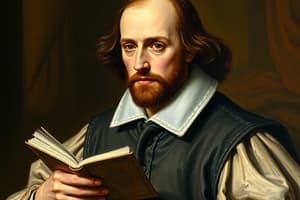Podcast
Questions and Answers
Who is credited with developing new historicism?
Who is credited with developing new historicism?
Stephen Greenblatt
When did new historicism first develop?
When did new historicism first develop?
1980s
What term did Stephen Greenblatt coin to describe this form of literary theory?
What term did Stephen Greenblatt coin to describe this form of literary theory?
new historicism
According to Harold Aram Veeser, what are some key assumptions of new historicism?
According to Harold Aram Veeser, what are some key assumptions of new historicism?
What is the aim of new historicism?
What is the aim of new historicism?
Flashcards are hidden until you start studying
Study Notes
New Historicism
- Stephen Greenblatt is credited with developing new historicism.
Origins
- New historicism first developed in the 1980s.
Key Concepts
- Stephen Greenblatt coined the term "cultural poetics" to describe this form of literary theory.
Assumptions
- According to Harold Aram Veeser, key assumptions of new historicism include: • A rejection of the idea that literary texts can be understood in isolation from their historical context. • A focus on the material conditions and cultural practices that shape literary production and reception. • An emphasis on the complexities and nuances of historical contexts.
Goals
- The aim of new historicism is to analyze literary texts in relation to the historical and cultural contexts in which they were written.
Studying That Suits You
Use AI to generate personalized quizzes and flashcards to suit your learning preferences.




